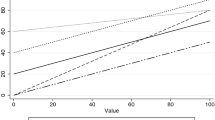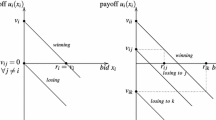Abstract
Laffont and Tirole (1987) analyzed the problem of a regulator that wants to select one ofn firms to carry out a single indivisible project when the firms have private and independent costs and have the possibility of an ex-post investment in (non-observable) effort to reduce the (observable) cost.
This paper generalizes the analysis to a model of common costs, unknown at the bidding stage, while keeping the assumption of independent types. I show that the main characteristics of the private costs model are kept in a common cost framework. I provide two mechanisms that may be used to implement the optimal contract.
Similar content being viewed by others
References
Bikhchandani, Sushil, and John G. Riley. 1991. “Equilibria in Open Common Value Auctions.”Journal of Economic Theory 53(1): 101–130.
Branco, Fernando. 1992a. “The Design of Multidimensional Auctions.” Working Paper WP#19-92, Banco de Portugal, Lisbon, Portugal.
Branco, Fernando. 1992b. “Optimal Auctions of an Indivisible Good-Extending the Optimality of Standard Auctions.” Mimeo, MIT.
Bushnell, James B., and Shmuel S. Oren. 1994. “Bidder Cost Revelation in Electric Power Auctions.” Journal of Regulatory Economics 6(1): 5–26.
Che, Yeon-Koo. 1993. “Design Competition through Multidimensional Auctions.”Rand Journal of Economics 24(4): 668–680.
Harstad, Ronald M., John Kagel, and Dan Levin. 1990. “Equilibrium Bidding Functions for Auctions with an Uncertain Number of Bidders.” Economics Letters 33(1): 35–40.
Laffont, Jean-Jacques, and Jean Tirole. 1987. “Auctioning Incentive Contracts.”Journal of Political Economy 95(5): 921–937.
Laffont, Jean-Jacques, and Jean Tirole. 1993.A Theory of Incentives in Regulation and Procurement. Cambridge, Massachusetts: The MIT Press.
Maskin, Eric, and John Riley. 1984. “Optimal Auctions with Risk Averse Buyers.”Econometrica 52(6): 1473–1518.
McAfee, R. Preston, and John McMillan. 1986. “Bidding for Contracts: A Principal-Agent Analysis.”Rand Journal of Economics 17(3): 326–338.
McAfee, R. Preston, and John McMillan. 1987. “Competition for Agency Contracts.”Rand Journal of Economics 18(2): 296–307.
McAfee, R. Preston, John McMillan, and Philip J. Reny. 1989. “Extracting the Surplus in the Common-Value Auction.”Econometrica 57(6): 1451–1459.
Milgrom, Paul R., and Robert J. Weber. 1982. “A Theory of Auctions and Competitive Bidding.”Econometrica 50(5): 1089–1122.
Myerson, Roger B. 1979. “Incentive Compatibility and the Bargaining Problem. “Econometrica 47(1): 61–73.
Riordan, Michael H., and David E. M. Sappington. 1987. “Awarding Monopoly Franchises.”American Economic Review 77(3): 375–387.
Author information
Authors and Affiliations
Additional information
This is a much revised version of a part of chapter one of my Ph.D. dissertation. I would like to thank Drew Fudenberg, Oliver Hart, and two anonymous referees for their comments. I am especially indebted to Jean Tirole, who suggested this problem to me. I have also benefited from presentations at MIT and the EARIE 93 Meeting. Financial support from INVOTAN (grant 3/88/PO) is gratefully acknowledged. Remaining errors are my own.
Rights and permissions
About this article
Cite this article
Branco, F. Auctioning incentive contracts: The common cost, independent types case. J Regul Econ 7, 277–292 (1995). https://doi.org/10.1007/BF01067098
Issue Date:
DOI: https://doi.org/10.1007/BF01067098




